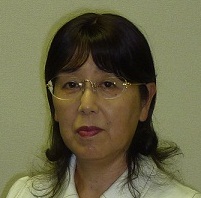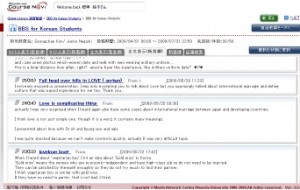02-01. BBS Play a Huge Role in Pre- and Post-Class Discussions and Group Work Prior to Presentations
Junko Negishi
Part-Time Lecturer, Open Education Center
The Open Education Center’s Global Literacy Seminar, run by Ms. Negishi, is a joint seminar with students at South Korea’s Korea University that relies on a teleconferencing system. In this course involving exchanges between students separated by long distances, next in importance to the teleconferencing system is Course N@vi. We asked Ms. Negishi about how she makes use of Course N@vi and its advantages.
Upload presentation materials beforehand to Course N@vi
The Global Literacy Seminar is one of the Theme College seminar courses at the Open Education Center. What is special about this course are the international communications and cross-cultural exchanges using information and communication technology (ICT) on the theme of understanding English and other cultures.
The classes are intensive, lasting for two consecutive periods, and small, kept to around 20 students. Each class, students from Waseda University and Korea University give presentations on student-selected topics and have discussions about the presentations entirely in English.
Students in the group that will be giving a presentation create Word files with documents and materials on the topic and a PowerPoint file for the presentation ahead of time and upload these files to Course N@vi the day before the presentation.
To enable this sort of group work, students at Korea University in the course are given Course N@vi IDs and passwords so they can use Course N@vi from overseas. Students are also given Course N@vi privileges to upload materials (with normal student privileges, students are not able to upload data other than reports; therefore, individual students in this course must be given uploading privileges). Ms. Negishi said “it has been a great help because students can distribute preliminary materials to everyone directly without needing the involvement of faculty members.”
All students participating in the class look over the materials ahead of time before listening to the presentation and joining the discussions on the class day.
BBS deepens discussions after classes
Students from both Waseda University and Korea University are required to post their opinions on the week’s topic using Course N@vi’s BBS function after each class. Furthermore, students must make at least one reply to any comments on their post.
“A problem we had was not reaching satisfactory resolutions within the class time allotted for discussions. We found we could have deeper discussions by giving students more time to think about the topic and then post their opinions on a BBS.” BBS also benefit faculty members in determining how well students understand the topic because the BBS save all discussions for faculty members to review later.
BBS not only permit faculty members to evaluate the frequency and content of posts; they encourage very active exchanges of opinions. A student questionnaire found that close to 30 percent of students access the BBS seven or more times a week.
In many other instances where BBS have been set up at the university, the number of posts and posters has tended to drop off as interest wanes. But in this course, the BBS have been kept lively by setting rules that oblige faculty members to also post. Making the first posts compulsory appears to get students to enjoy the discussions. “It’s partly because they are familiar with each other from the videoconferences, but the BBS let the students deepen their exchanges and bring them closer together. Some students have even travelled to the other country to visit each other at the end of the semester.”
What students have appreciated the most is the system that sends them an email when their posts are commented on. “With this system, they only have to access the BBS when necessary, so they can participate more efficiently.”
On the other hand, some students have complained about having to log into Course N@vi each time they want to post on a BBS. “It appears that (in Ver. 3.0) students will be able to post directly without logging into Course N@vi by following the reply link in alert emails, so I really want to encourage students to use this.”
Course N@vi for report submissions too
In addition to the Global Literacy Seminar’s BBS postings, Ms. Negishi gives students opportunities to have voice chats outside of class time. (The voice chat system is separate from Course N@vi.) Because not all students can talk during class time, voice chats are used for two or three students from each university to discuss topics over five or six weeks.
The chats take place at times convenient for the students and there is no direct mediation by faculty members, although TAs take care of attendance management and handle problems. Instead, each week after the chat is over, each student uploads a summary about the chat, equivalent to an A4 page, to Course N@vi. “Online submissions save the students and the faculty members time compared to collecting papers in class. Course N@vi also lets you set time limits on uploads, which is very convenient. The most recent version lets me specify the acceptable filename extensions, which is a great help too.” In the past, students would sometimes send files in formats that faculty members could not open. Being able to limit which filename extensions can be uploaded has remedied this problem.
BBS used for student meetings as well
Another use of Course N@vi BBS is for groups to hold meetings prior to giving a presentation. “In the past, the group giving a presentation the following week had to stay in the classroom after class to have their meetings. With the BBS, they can have meetings at a time convenient for everyone while at home or any other place, which is much more efficient.”
Course N@vi is highly integrated into the Global Literacy Seminar, from uploads of materials before classes and student meetings prior to presentations to post-class discussions on BBS and uploads of chat summaries. The system is also used by faculty members to post syllabuses or send announcements to students.
When Ms. Negishi started teaching this class in 2008, a course management system using Course N@vi was already in place and both faculty members and students were well accustomed to using Course N@vi. “At the beginning, I was a little perplexed by the Course N@vi preference windows because they worked a bit differently from Windows. But over the last year and a half, many details have been improved and it has gotten much easier to use.”
Students’ mail spool is an issue
One current complaint Ms. Negishi has is the 5 MB cap on students’ Waseda-net mail sizes, which she considers much too small. “Email announcements to students often bounce back because they are too big.” (Secondary email was introduced in July 2009 to address this problem. See the sidebar for more information.)
She also finds the 5 MB cap on file sizes inconvenient when uploading materials. “It’s particularly a problem because Korean students occasionally send enormous files with large images attached.” (It is possible to increase the maximum file size to 30 MB, though a separate application must be made for each lecture.)
As a part-time lecturer, Ms. Negishi has opportunities to use similar systems at other universities. We asked about her impressions of Course N@vi in contrast to other systems. “I feel Course N@vi is highly functional and has a lot of features. At the same time, some parts were initially hard to grasp. It might be an idea to have two modes you could select from at the start: a simple mode with a reduced feature set and an advanced mode for people who want to use more advanced features.”
Tips on implementing Course N@vi
“BBS are an essential part of cross-cultural exchanges, and we couldn’t run the course without them. I believe they can be used in other courses as well for student group work meetings.”
BBS contributions account for 15 percent of the final grade in the Global Literacy Seminar.



